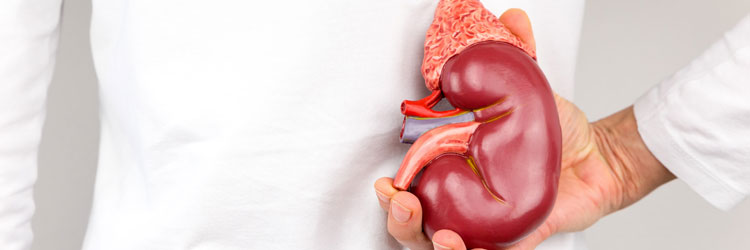
Kidney failure or end “stage kidney”, occurs because of:
- Diabetic Nephropathy – damage to the filters in the kidneys over a number of years, due to high blood sugar levels.
- Hypertension – High blood pressure in the tiny blood vessels of the kidneys causes damage and prevents the filters in the kidney from functioning effectively.
- Renal Artery Stenosis – blockage of blood flow to the arteries leading to the kidneys.
- Polycystic Kidney – inherited disease that causes large cysts or hollow spaces to form in the kidneys, disabling the kidneys from functioning normally.
- Congenital Birth Defect – occurs in the foetal stage and manifests itself when 90% of the kidneys are damaged.
- Dysfunction of the Immune System – when the body’s immune system malfunctions and fails to recognize the kidney as an organ in the body, the immune system attacks it.
The main function of the kidneys is to remove the waste products (urea) from the body through a filtration process. When the kidneys lose 90% of their ability to remove high levels and life threatening waste products and chemicals, from the body, it indicates the end stage of kidneys. Kidney transplant helps redress dire consequences.
Procedure
Kidney transplantation is a surgical procedure where a healthy kidney is transplanted into the ailing patient’s body, to replace the malfunctioning diseased kidneys. Donor kidneys are obtained from
- Deceased organ donor (Cadaver).
- A living donor either from a family member or from unrelated individuals, who are a match.
Generally a person undergoing kidney transplantation, receives only one kidney. In rare cases two kidneys are transplanted. During the transplantation, the diseased kidneys are left in place. The implantation of the transplanted kidneys is within the lower abdomen, to the front or anterior part of the body.
Transplantation of the kidney can be performed on anybody, regardless of age. The patient in need of a kidney transplant may have to wait on the waiting list, until a matching donor is found. Meanwhile the patient will be maintained on dialysis. To be eligible for a transplant, the patient must be ready to be operated upon, at short notice. Further, the patient must have a general health status in order to withstand the major surgical procedure. Additionally the patient must comply with the requirement of taking immunosuppressant medication to prevent rejection of the new organ in the body.
Post-surgical care instructions will be provided by the surgeon and the stitches or staples will be removed during a follow up visit to the hospital.
Make an appointment
An appetite for miracles
“Discovery of the first strand of grey hair sounds a series of alarms in people’s minds. They picture a life, incapacitated by various ailments. My ides of old age was no different. At the age of 64, I was diagnosed with diabetes and hypertension. I had come to terms with it, believing that lifestyle disease were an inescapable part of elderly life. My life took a complete U-turn, when I went to Kauvery Hospital along with my insistent wife, for a check- up. We were referred to a Geriatrician, who specializes in healthcare for the elderly. He counseled us on the importance of eating and exercising right, leading an active and productive life and above all, he made us realize that age is just a number. He inspired me and my wife to discover the little joys of life. Today, I am a new person and it feels wonderful to be born again, after 60.”


